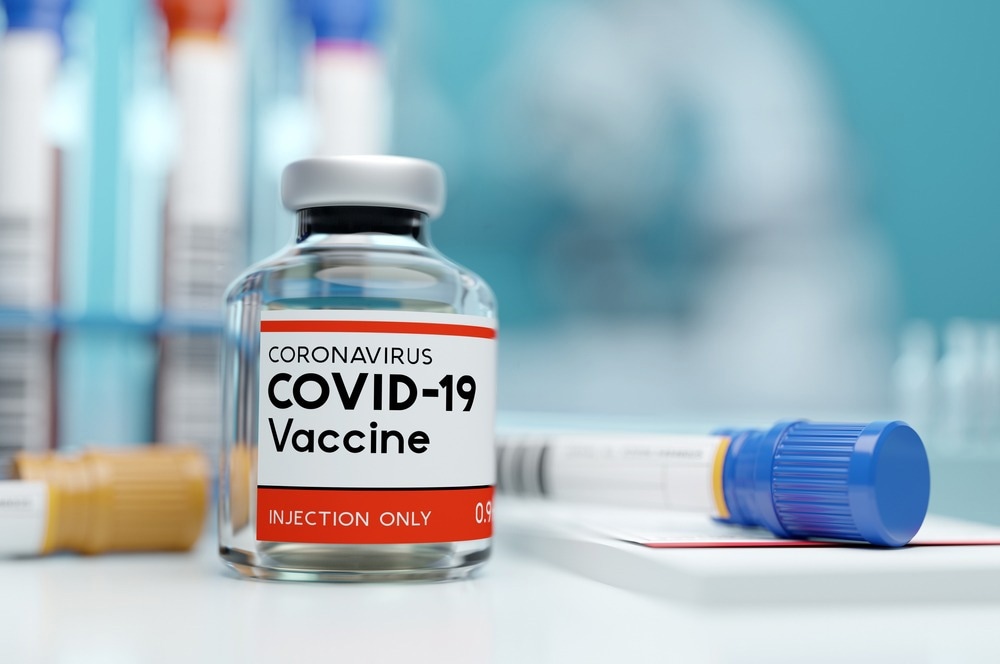In a recent study published in the journal Nature Medicine, researchers in Isreal investigated the effects of the recommended third dose (booster) of maternal BNT162b2 messenger ribonucleic acid (mRNA) coronavirus disease 2019 (COVID-19) vaccine during pregnancy on COVID-19-related hospitalization rates among infants.
Study: Maternal third dose of BNT162b2 mRNA vaccine and risk of infant COVID-19 hospitalization. Image Credit: solarseven / Shutterstock.com
Background
Newborns are more vulnerable to severe acute respiratory syndrome coronavirus 2 (SARS-CoV-2) infection-associated hospital admissions than children of older age. COVID-19 mRNA vaccines have been approved for six-month-olds. However, preventing COVID-19 and critical illness among the younger infant group remains a health concern. COVID-19 vaccination during pregnancy could confer humoral immune protection to fetuses through vertical transmission of antibodies.
Maternal two-dose COVID-19 mRNA vaccinations during pregnancy reportedly prevent COVID-19-associated hospital admissions and critical illness among infants aged <6.0 months. Especially in cases where the second vaccine is administered following 20 gestational weeks.
However, data on the immunological effects of booster maternal SARS-CoV-2 vaccinations on preventing SARS-CoV-2 infection-associated hospital admissions in infants are limited.
About the study
In the present national-level cohort study, researchers evaluated the maternal triple dose versus double dose COVID-19 BNT162b2 mRNA vaccine effectiveness (VE) against hospitalizations associated with COVID-19 in infants.
The study comprised live-born infants birthed in Israel between August 24, 2021, and March 15, 2022. The VE estimates were separately assessed for the periods of SARS-CoV-2 Delta variant of concern (VOC) and Omicron VOC predominance.
Cox proportional hazards-type regression modeling was performed, and the hazard ratios (HRs) were calculated for infant COVID-19-associated hospital admissions based on the status of maternal SARS-CoV-2 vaccination during delivery.
The team included pregnant women who received the booster dose ≥5.0 months after the second COVID-19 vaccine dose. The period between August 24, 2021, and December 1, 2021, was considered the Delta VOC dominance period, and between December 15, 2021, and March 15, 2022, it was considered the Omicron dominance period.
Results
A total of 22,231 (46%), 13,364 (27%), and 13,273 (27%) infants belonged to three-dose COVID-19 vaccinees, two-dose COVID-19 vaccinees, and non-COVID-19 vaccinees, respectively. In total, 352 infants (0.7%) of <3.0 months of age were admitted in association with COVID-19 during the study period.
Among the 48,868 infants with live births analyzed, COVID-19-associated hospitalization rates were 0.70%, 0.60%, and 0.40% among unvaccinated, double-dose, and triple-dose vaccinees, respectively.
Compared to two-dose COVID-19 BNT162b2 VE, the booster dose VE in lowering infant SARS-CoV-2-associated hospital admission risks was 53.0% for the initial 120.0 days of life. Stratifying by gender and gestational age yielded similar VE estimates. Greater immune protection was related to shorter durations between COVID-19 vaccinations and infant delivery.
Among 263 infants with COVID-19-associated hospitalizations, six percent (n=15) had preterm births, eight percent (n=20) had neonatal intensive care unit (NICU) hospitalizations at delivery, and six percent (n=15) had congenital abnormalities in the heart, brain, skeletal muscles, and the urinary tract.
A median value of 47 days was observed for the age of infants at hospitalization. The hospitalization duration was 1.8 days for infants of three-dose vaccines,2.3 days for two-dose vaccines, and 2.4 days for infants of non-vaccinees.
Out of pediatric ICU (PICU)-admitted infants, two belonged to three-dose vaccinees, three belonged to two-dose vaccines, and five belonged to unvaccinated mothers. No COVID-19-associated infant mortality was reported in the study period. The HR of three-dose vs. two-dose COVID-19 vaccine administrations against infant COVID-19-associated hospitalizations was 0.5.
The third vaccine dose more effectively prevented infant COVID-19-associated hospitalizations, at the initial 90.0 days following delivery, with HR values of 0.4, 0.5, and 0.5 for the initial 29.0 days, 30. days to 59.0 days, and 60.0 days to 89.0 days, respectively.
During Delta VOC predominance, 16 infants (of 23,865 infants) had COVID-19-associated hospitalizations, among whom, none belonged to three-dose vaccinees, four belonged to two-dose vaccinees, and 12 infants belonged to non-vaccinees, respectively.
During Omicron VOC predominance, 50 infants (of 20,893 infants) had COVID-19-associated hospitalizations, among whom 17, 19, and 14 belonged to three-dose vaccinees, two-dose vaccinees, and non-vaccinees, respectively.
The three-dose vs. two-dose VE could not be estimated during Delta VOC predominance due to the limited number of cases (none and four in the three-dose and two-dose groups, respectively) and COVID-19 BNT162b2 mRNA VE of 65.0% was observed during Omicron predominance.
Conclusion
Overall, the study findings showed that booster dose administration to pregnant women lowered infant COVID-19-associated hospitalizations during the initial 4.0 months post-delivery, encouraging maternal third-dose vaccination to prevent COVID-19 severity outcomes in their infants.
Infant vaccine effects may be regulated by vertical transplacental antibody transfer via breastfeeding and lowered susceptibility among infants born to an immunologically protected mother against SARS-CoV-2. Updated, multivalent COVID-19 vaccine administration may improve anti-SARS-CoV-2 immunity.
